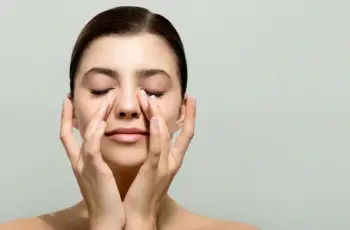
How to Tell If Your Skin Is Dehydrated (and What to Do About It)
Most of us are familiar with many of the symptoms of dehydration, such as fatigue, headaches, and cramping. However, dehydrated skin can be harder to recognize, in large part due to its similarities to dry skin. Although the two terms are often used interchangeably, there are some major differences.
We asked board-certified dermatologists Gloria Lin, MD, and Melanie Palm, MD, to tell us all about dehydrated skin, including symptoms, how it differs from dry skin, and how to treat it. Read on for the ultimate guide to dehydrated skin.
What is Dehydrated Skin?
“Dehydrated” skin means your skin lacks water. If your body loses more water than it takes in, your skin is dehydrated. This can happen for several reasons, such as:
Not Drinking Enough Water: Your body naturally loses water through many daily activities, such as exercise, sweating, urinating, and even breathing, so it’s important to drink enough water throughout the day to replace what you lose. “If you don’t drink enough water each day to prevent your body from losing more water than it takes in, you’re at a higher risk for dehydration,” says Palm.
Not moisturizing enough: For some people, especially those with a compromised skin barrier, drinking water isn’t enough to prevent skin dehydration, Palm explains. “In these cases, regular moisturizing can help by using products that help seal moisture into the skin barrier,” she says.
Living in a very hot or dry place: People who live in hot and dry climates are more likely to lose water through the surface of their skin than those who live in humid and temperate areas. Unfortunately, this water loss can lead to dehydrated skin. Similarly, heating in the winter can cause water to evaporate from the surface of the skin, which can lead to dehydration, Palm says.
Hot showers, lack of sleep, use of harsh soaps and skin care products, and over-exfoliation can also contribute to dehydrated skin.
What are the symptoms of dehydrated skin?
Dehydrated skin may appear tight, rough, dry, flaky, or dull. Your skin may also feel itchy, you may have dark circles under your eyes, and you may notice more pronounced fine lines or wrinkles. “Because our skin relies on water to maintain its moisture barrier, dehydrated skin can also appear to have a weakened or compromised skin barrier,” Palm says. If left untreated, a damaged skin barrier can lead to conditions like eczema, skin infections, acne, and psoriasis.
Dehydration affects the entire body, so you may also experience signs of dehydration beyond the skin, such as dizziness and lightheadedness.
Dry Skin vs. Dehydrated Skin
Dry skin and dehydrated skin sound similar, but they are not the same thing. Having dry skin does not mean that the skin is dehydrated, and vice versa. “Dry skin is a skin type that you are born with, similar to oily or combination skin,” explains Lin. “Dehydrated skin, when treated, is a temporary skin condition caused by a lack of water in the top layer.”
Dehydrated skin can occur on many skin types, including oily and combination skin. You can easily identify them by pinching a small area of skin on the back of your hand and holding it for a few seconds. “If the skin takes a while to recover, then your skin may be dehydrated,” says Lin.
Dry skin is caused by insufficient oil, or sebum, production. Normally, this oil keeps the skin healthy and moisturized, but sebum production decreases with age, sometimes causing the skin to look flaky or irritated.
Dry skin can be treated with moisturizers, while dehydrated skin needs hydration. “This means that dry skin benefits from more cream-based products, while dehydrated skin needs more moisture-rich products,” says Lin.
How to Treat Dehydrated Skin
Stay hydrated: “Drinking enough water is the first step in treating dehydrated skin,” says Palm. “The amount of water you should drink each day depends on your weight, activity level, and other factors—in general, it’s recommended that most people should drink six to eight glasses [of water] a day.” To help your body retain water and important minerals, consider adding electrolyte supplements to your drinking water. You can also eat hydrating foods like fruits and vegetables.
Get enough sleep: You should also make sure you get enough sleep, as this can affect the health of your skin.
Moisturize: “Use an emollient moisturizer or lotion that helps the skin retain moisture, such as hyaluronic acid,” advises Palm. Other products that help repair and seal the skin barrier include squalene, ceramides, and glycerin. “I recommend using a moisturizer with these ingredients after showering to lock in moisture,” says Palm.
Check your skincare routine: It’s also a good idea to make sure your daily regimen is gentle enough for your skin. As Lin tells us, skincare products can often lead to dehydrating the skin. “That’s why you should stop using any products that may irritate, dry out, or exfoliate your skin for a few weeks while you try to restore moisture,” she says.
Use a humidifier: If you live in a very dry, hot climate where the air tends to strip moisture from your skin, using a humidifier can help your skin retain moisture.
Final Verdict
If your skin is dehydrated, it may appear dull and flaky, you may have more fine lines and wrinkles than usual, you may also feel itchy, and you may have dark circles under your eyes. One of the best ways to treat dehydrated skin is to drink more water. But you can also try other measures, such as using hydrating skin care products, using a humidifier at home, and prioritizing sleep.


